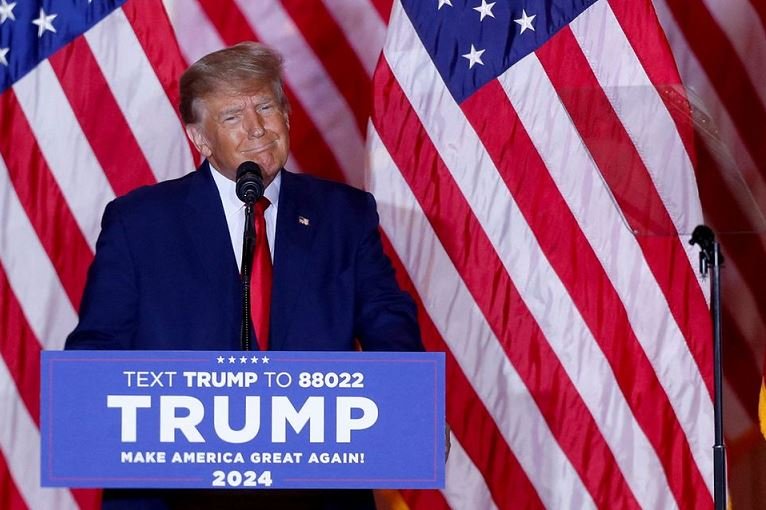Election
Trump launches 2024 US presidential run

Donald Trump, who has mounted relentless attacks on the integrity of US voting since his 2020 election defeat, on Tuesday launched a bid to regain the presidency in 2024, aiming to pre-empt potential Republican rivals.
Seeking a potential rematch with Democratic President Joe Biden, Trump made his announcement at his Mar-a-Lago estate in Florida a week after midterm elections in which Republicans failed to win as many seats in Congress as they had hoped.
In a speech lasting little more than an hour, Trump spoke to hundreds of supporters in a ballroom decorated with chandeliers and lined with American flags.
“In order to make America great again, I am tonight announcing my candidacy for president of the United States,” Trump said to the phone-waving crowd, which included family members, donors and former staffers.
Trump steered clear of the name-calling that has marked other public appearances, opting instead for a critique of Biden’s presidency and a review of what Trump said were the policy achievements of his own time in office.
“Two years ago we were a great nation and soon we will be a great nation again,” he said.
Trump laid out familiar dark themes from his playbook, denouncing migrants – “We’re being poisoned” – and portraying American cities as crime-ridden “cesspools of blood.”
He said he would push for the death penalty for drug dealers and rehire members of the military who had been dismissed for refusing to get the COVID-19 vaccine.
Although he assailed the US election process, Trump did not use his speech to revive his false claims of massive voter fraud in 2020 and did not mention the violent attempt by his supporters on Jan. 6, 2021, to prevent Congress from certifying Biden’s victory.
On a trip to Indonesia, Biden said “not really” when asked if he had a reaction to Trump’s announcement. On Twitter, he posted a video criticizing Trump’s record in office.
LONG ROAD
There is a long road ahead before the Republican nominee is formally selected in the summer of 2024, with the first state-level contests more than a year away.

Former US President Donald Trump stands onstage listening to applause as he arrives to announce that he will once again run for US president in the 2024 US presidential election during an event at his Mar-a-Lago estate in Palm Beach, Florida, US
REUTERS
His announcement comes earlier than usual even in a country known for protracted presidential campaigns, and signals his interest in discouraging other possible contenders such as Florida Governor Ron DeSantis or his own former vice president, Mike Pence, from making a bid for the Republican Party’s nomination.
DeSantis handily won re-election as governor last week. Pence has sought to distance himself from Trump while promoting a new book. Other potential Republican presidential hopefuls include Virginia Governor Glenn Youngkin, Texas Governor Greg Abbott, former South Carolina Governor Nikki Haley and former Secretary of State Mike Pompeo.
Trump played an active role in the midterms, recruiting and promoting candidates who echoed his false claims that the 2020 election was stolen from him through widespread voting fraud.
But many of his candidates in key battleground states lost, prompting some prominent Republicans to openly blame him for promoting weak candidates who derailed the party’s hopes of taking control of the Senate.
Control of the House of Representatives remains up in the air, but Republicans are on track to win a razor-thin majority.
The former New York mayor will seek his party’s nomination even as he faces trouble on several fronts, including a criminal investigation into his handling of government documents, a congressional subpoena related to his role in the Jan. 6, 2021, assault. Trump has called the investigations politically motivated and has denied wrongdoing.
Trump, 76, is seeking to become only the second US president in history to serve non-consecutive terms, after Grover Cleveland, whose second stint ended in 1897. Biden, 79, said last week he intends to run for re-election and will likely make a final decision by early next year.
In an Edison Research exit poll, seven out of 10 midterm voters expressed the view that Biden, who remains deeply unpopular, should not run again. In the same poll, six of 10 respondents said they had an unfavorable opinion of Trump.
TRUMP’S PRESIDENCY
During his turbulent 2017-2021 presidency, Trump defied democratic norms and promoted “America First” nationalism while presenting himself as a right-wing populist. He cut taxes and secured a conservative majority on the Supreme Court. He alienated U.S. allies and praised authoritarian leaders, including Russia’s Vladimir Putin.
He became the first US president to be impeached twice, though congressional Democrats failed to remove him from office.
At a rally that preceded the Capitol attack, Trump urged supporters to march on Congress to “stop the steal,” but the mob that subsequently stormed the Capitol failed to prevent Congress from certifying Biden’s election victory.
Even though court and state election officials rejected Trump’s false election claims, about two-thirds of Republican voters believe Biden’s victory was illegitimate, according to Reuters/Ipsos polling.
Trump has elicited passionate support from many Americans, especially white men, Christian conservatives, rural residents and people without a college education. Critics accuse Trump of pursuing policies built around “white grievance” in a nation with a growing non-white population.
The political landscape has changed dramatically since he won the presidency in 2016 and some in his party, including major donors, are exhausted by the drama surrounding him.
Ivanka Trump was not at the event, although her husband Jared Kushner was along with her brothers Don Jr. and Eric. She issued a statement saying: “I do not plan to be involved in politics. While I will always love and support my father, going forward I will do so outside the political arena.”











